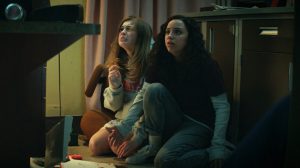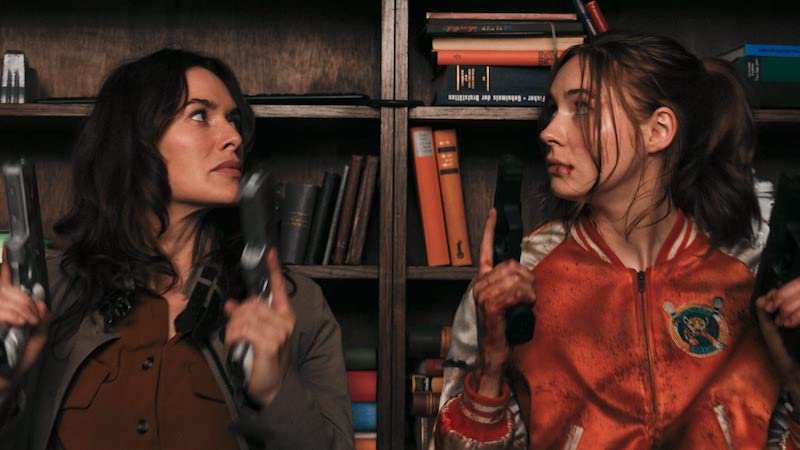Scarlet: There’s not a single person on Earth I’d rather kill people with.
Sam: Thanks, Ma.
Ah yes, nothing like mother-and-daughter bonding. And the related violent family hijinks help make Israeli director Navot Papushado’s stylish, bloody crime thriller “Gunpowder Milkshake” (R, 114 minutes, on Netflix) so entertaining.
Daughter Sam (Karen Gillan) has followed mom Scarlet (Lena Headey) into the assassin business. Working for a powerful organization known as “The Firm,” Sam becomes a target herself when she 1) kills the wrong person (through no fault of her own) and 2) chooses to save the life of an 8-year-old girl, Emily (Chloe Coleman), rather than retrieve a suitcase full of cash for her employer.
On the run with Emily in tow, Sam must take on many fellow killers to survive, but she’s up to the task. Sam’s a lot like Uma Thurman’s “The Bride” in the “Kill Bill” movies as she stoically uses her martial-arts skills to slaughter a ridiculous number of weapons-wielding opponents. It’s absurd, but Gillan makes such a convincing, easy-to-root-for badass, and the action is so well choreographed, that we’re more than willing to suspend our disbelief while watching Sam let ’er rip.
This is yet another “female empowerment” film. The heroes are all women: Sam, Scarlet and a trio of unusual librarians played by Carla Gugino, Angela Bassett and Michelle Yeoh. The villains are all men. Again and again, the women kick the men’s butts. But “Gunpowder Milkshake” manages to depict this rebellion against the patriarchy without the self-righteous, self-congratulatory heavy-handedness of movies like “Hustlers,” “The Kitchen” or “Widows,” and it’s much more effective as a result.
The comic relief helps, whether it’s the over-the-top action scenes, Sam carrying a bag with “I (Heart) Kittens” written on it, or a diner where you deposit your gun with the waitress before you can be seated.
There reportedly are plans for a sequel, and I’m all in for it. ***½ (out of four)
Time flies when …
When I heard M. Night Shyamalan was coming out with a movie called “Old” (PG-13, 108 minutes, in theaters), I thought, “Finally, a movie about me.”
Oh well, wrong again.
In a way, though, it’s about all of us, and our concepts of time.

Gael Garcia Bernal and Vicky Krieps play a couple dealing with more than a few issues in “Old.” (Universal Pictures)
Shyamalan telegraphs early on that time is the subject at hand with lines like “Stop wishing away this moment,” “You’re always thinking of the future” and “You’re always thinking of the past.” Soon enough, we’re presented with the film’s big question: What if we aged a lifetime in the course of one day?
Talk about living life in the moment.
That’s the situation for several people (played by Gael Garcia Bernal, Vicky Krieps of “The Phantom Thread,” and Rufus Sewell, among others) who have traveled to a tropical resort thinking they’ll experience fun in the sun, only to wind up on a remote beach where time goes by mighty quickly, with horrific results.
As is the case with pretty much all of Shyamalan’s films, which have ranged from excellent (“The Sixth Sense,” “Unbreakable”) to awful (“The Happening,” “After Earth”), it’s not quite clear what’s going on until the end.
As for “Old,” it tests one’s patience waiting for the big reveal. It’s just one awful thing after another, sort of like Ari Aster’s “Midsommar,” without the culty stuff. The payoff is OK, but hardly mind-blowing; it’s somewhat of a letdown after such a long wait.
The best thing about the film? The questions it raises. Really, what if life was compressed into a day? How would that change our behavior, our thinking? Would it be the horror show as presented in “Old”? What if that was the speed at which life always unfolded? **½
More shameless self-promotion:
We now interrupt this column for a special announcement:
The Woods Hole Film Festival will mark its 30th — that’s right, 30th — year when it officially begins July 31 and runs through Aug. 7. But starting Saturday, July 24, and continuing during the festival, a series of morning chats will be held on Facebook Live with filmmakers screening movies in the fest.
I’m scheduled to lead five of them: at 9 a.m. Sunday, July 25; Tuesday, July 27; Friday, July 30; and Saturday, July 31; and 10 a.m. Thursday, July 29. (Hey, if I have to wake up at the crack of dawn, you can, too!)
I led several of these virtual morning conversations with filmmakers last year, and they were a lot of fun. At least, I thought so. If you’d rather avoid me (understandable), several other hosts will lead the other sessions.
To take part (it’s free), visit www.facebook.com/woodsholefilmfestival .
More festival info: www.woodsholefilmfestival.org .
We now return you to your regular programming:
Down and dirty in Detroit
Director Steven Soderbergh (“Out of Sight,” “The Limey,” “The Underneath”) returns to film noir with “No Sudden Move” (R, 115 minutes, HBO Max). Set in grimy 1954 Detroit, it presents a convoluted tale about three crooks holding a family hostage in order to get their paws on valuable documents involving the auto industry. Naturally, things go very wrong, and the criminals need to adapt if they hope to survive.
Soderbergh has assembled quite the cast to play the colorful characters. Don Cheadle stars as raspy-voiced Curt Goynes, who’s just out of prison and needs this one job before he can get on with his life.
Cheadle thrives in this type of role — his trigger-happy Mouse in “Devil in a Blue Dress” remains one of his best performances — and here he delivers another compelling tough guy. Benicio Del Toro and Kieran Culkin (who steals every scene he’s in) appear as Goynes’ fellow gunmen, with David Harbour, Jon Hamm, Ray Liotta, Julia Fox, Brendan Fraser, Amy Seimetz, Bill Duke and a special surprise star effectively filling in other typical noir roles.
Though the ending falls flat, and the theme of corruption in places high and low is nothing new, the characters and the atmosphere make “No Sudden Move” worth a look. ***
Return of the slasher

Kiana Madeira, right, and Olivia Scott Welch star as teenage lovers terrorized by supernatural forces in the “Fear Street” trilogy. (Netflix)
Thanks to the popularity of the “Halloween,” “Friday the 13th” and “A Nightmare on Elm Street” series, slasher movies have been with us off and on, for better or (mostly) worse, for more than 40 years.
The latest revival comes with the “Fear Street” trilogy on Netflix. The three films, released on successive Fridays in July, go back in time, as indicated by their titles: “Fear Street: Part One — 1994” (R, 107 minutes), “Fear Street: Part Two — 1978” (R, 109 minutes) and “Fear Street: Part Three — 1666” (R, 114 minutes).
Though their settings and time periods vary, all three involve the mysterious legend of a witch and a curse, and the related slaughter of young people. Directed by Lee Janiak, also one of the screenwriters, these movies, heavily influenced by Stephen King’s horror and based on R.L. Stine’s “Fear Street” books, offer a more imaginative, compelling story than most slasher flicks. “Part Three,” for instance, set mostly in a Puritan-type village (Arthur Miller, anyone?), does a nice job of wrapping up the mystery.
But there also are problems that come with the genre. “Part Two,” set in a summer camp (think “Friday the 13”), depicts young children getting chopped up by a maniac. Janiak makes the wise choice of not showing the kiddos as they’re receiving the blows (unlike the older, teenage victims), but the aftermath of their mutilation is on display. It makes you wonder, “Exactly why am I watching this?” Also, especially in the first two films, we come to like some of the characters who wind up brutally murdered. Their deaths aren’t scary, or even shocking, as much as they are depressing.
There actually is a serious subplot involving the protagonist, Deena (Kiana Madeira), and how she’s considered a bad influence on her girlfriend, Hannah (Olivia Scott Welch), by those who are appalled by their lesbian relationship. For some, the trilogy suggests, not much has changed from 1666 to 1994 … or, presumably, 2021. “Part One”: **½, “Part Two”: **½, Part Three: ***
Bondage, anyone?
Is Macaulay Culkin the reincarnation of Leslie Howard?
I wondered this as I watched the 1934 adaptation of the W. Somerset Maugham’s novel “Of Human Bondage” (not rated, 83 minutes, Epix and elsewhere) the other night.
The book has been adapted two other times that I know of, in 1946 (with Paul Henreid and Eleanor Parker) and 1964 (with Laurence Harvey and Kim Novak). The ’34 version, starring Howard and Bette Davis, and directed by John Cromwell (“The Prisoner of Zenda”), remains the best known.
Davis gives what was considered her breakout performance as Mildred Rogers, a sharp-tongued tea-room waitress who becomes the object of obsession for club-footed medical student Philip Carey (Howard).
Wearing his heart on his sleeve, Philip pleads with Mildred to return his love, but Mildred, who uses him only when she needs him, mostly responds with cruel indifference.
Maugham’s story shows how romantic relationships can be twisted and destructive without the right balance of mutual love and respect. The film presents this idea powerfully, thanks especially to Davis’ uncompromising performance.
In playing what might be considered the victim of love, Howard, best known now as wimpy Ashley Wilkes in “Gone With the Wind,” pretty much mopes his way through the movie. As director Cromwell emphasizes Philip’s ongoing dismay with close-ups of his sad face, I realized that Howard bears a close resemblance to former child actor Culkin, only grown up and almost always ready to cry.
I can see it now: “Home Alone,” starring Ashley Wilkes! ***½ (for “Of Human Bondage,” that is)
** Click here for Tim Miller’s previous movie columns for Cape Cod Wave **
Please like Cape Cod Wave on Facebook.
Cape Cod Wave Magazine covers the character & culture of Cape Cod. Please see our Longform stories.
Tim Miller is a Cape-based member of the Boston Society of Film Critics. He and Tony Raine host “Tim ’n’ Tony’s Rock ’n’ Pop Show” from midnight to 3 a.m. Sunday nights/Monday mornings on WOMR (92.1-FM), WFMR (91.3-FM) and womr.org (archived shows at https://womr.org/schedule/broadcast-archive/ ) . He also teaches film at Cape Cod Community College in West Barnstable. You can contact Tim at [email protected] or follow him onTwitter @TimMillerCritic. Or you can ignore him completely.


































